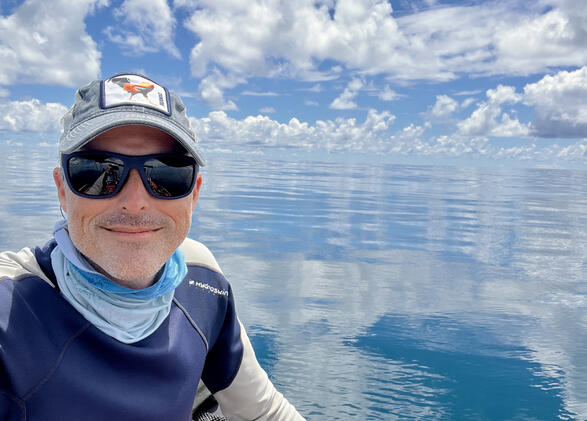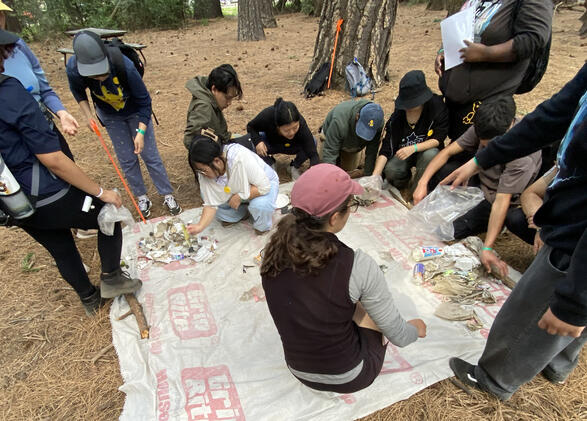NatureBridge Educator Spotlight: Shahne Belveal
It’s a blessing to grow up being surrounded by people who actively teach us about nature, about its beauty, and about why it’s so important to protect it. Unfortunately, not everyone has the luxury of a childhood immersed in nature and the outdoors.
The lack of minority professionals in the environmental and outdoor education field isn’t from a lack of desire. It’s from a lack of awareness, resources, and guidance on how to get there. As a result, we need people who come from these marginalized communities to lead the way for others who are experiencing the same barriers that they did.
People like NatureBridge educator Shahne Belveal, who works at our Golden Gate National Recreation Area campus.

A Sacramento native, 27-year-old Shahne is now entering his second year with NatureBridge. Born to a black mother and a white father, Shahne’s upbringing was unique. He frequently traveled and camped with his mom and sister as a kid, but not in the traditional way you might imagine.
“My mom worked for a magazine which had her traveling a lot for festivals, so we’d go camping all the time,” Shahne explained. “I went to Burning Man by the time I was 13. But I didn’t really learn anything about the nature space—I was just there.”
After completing his basic courses at community college, Shahne graduated from San Francisco State University where he was involved in countless volunteer and internship opportunities with outdoor organizations such as the Golden Gate National Parks Conservancy, Youth Outside, YMCA of San Francisco, and the Student Conservation Association, to name a few.
Despite his commitment to sustainability, it’s never been easy for Shahne to find his niche in the environmental field. Barriers like financial resources have made his journey an uphill battle.
“I worked four years at FedEx to get through community college,” Shahne said, “and I have back issues as a result of it.”
Not having the funds to purchase appropriate gear for his back has been a painful obstacle for him, especially as an educator who spends 8+ hours a day on foot. Yet one of his biggest obstacles was getting the necessary training to work with NatureBridge in the first place.
“For instance,” Shahne explained, “the WFR is a huge barrier.”
The WFR, or Wilderness First Responder, is a certification needed to work in most outdoor recreation and education roles. The two-week long course is pricey for some and not even an option for others who can’t afford to take two weeks off from their current jobs.
“I wouldn’t be here, and I wouldn’t be able to work in many outdoor jobs if I hadn’t gotten the [WFR] training paid for.”
Shahne’s love for the outdoors is largely due to the therapeutic effect it has had on his hyperactive and energetic personality. His lifelong struggle with attention issues recently hit a turning point with a late diagnosis of ADHD, a condition Shahne was unaware he had up until a few months ago. The one thing that has helped him cope has been immersion in nature, and he’s used his experiences to connect with students who are struggling with similar obstacles.
“Being in the outdoors and nature can be like medicine for a kid with ADHD or attention disorders,” Shahne said.
“There was one student, Alessa. I confided in her that I loved this job because it gave me ‘medicine.’ I told her I had ADHD, and she instantly opened up on her struggles as well. For the rest of the program she was just glued to my side, question after question. She made me a little card out of water color, which said ‘you are my best friend’.”

His interaction with Alessa is just one example of his perseverance and ‘pay-it-forward’ attitude. Shahne’s challenges have served as fuel to find ways for other aspiring young outdoor professionals from marginalized communities to get access to opportunities like the ones he has had.
“One perspective I want to help bring to NatureBridge is knocking down barriers and providing access,” Shahne told me. “Seeing some deficits at NatureBridge makes me want to help close that gap.”
Shahne hopes to capitalize on current NatureBridge efforts such as the Educator Development Program, which aims to increase the representation of minority groups, and other internal diversity, equity, and inclusion initiatives to help recruit more educators from minority communities.
“A lot of the time, you can’t really just go up to a kid that’s from one of these marginalized communities, and tell them to go to the park and nature,” Shahne explained. “You have to provide access for them, especially when you consider the disproportionate amount of stress that they encounter in their daily lives.”
“I see this and I see the effect it has on kids,” Shahne continued. “You’re not allowing them to be kids anymore when you consider everything they’re going through.”
Shahne’s commitment to his role as an educator serves as a testament to his tenacity for helping minority kids envision and actualize a career in the outdoor recreation and environmental field.
“That’s my motivation to help get kids from these communities to nature, and that’s what I want to help NatureBridge do more of.”
If you are part of an outdoor recreation and/or environmental organization who works with underrepresented communities, we want to hear from you!
Reach out to us to learn more about employment with NatureBridge, our overnight environmental education programs, and how we can work together to provide a more inclusive environmental space for all.

